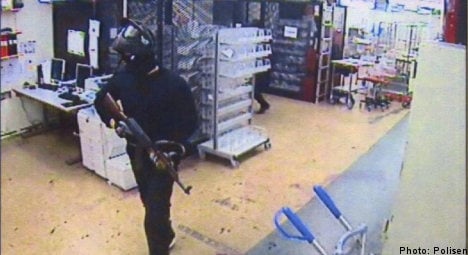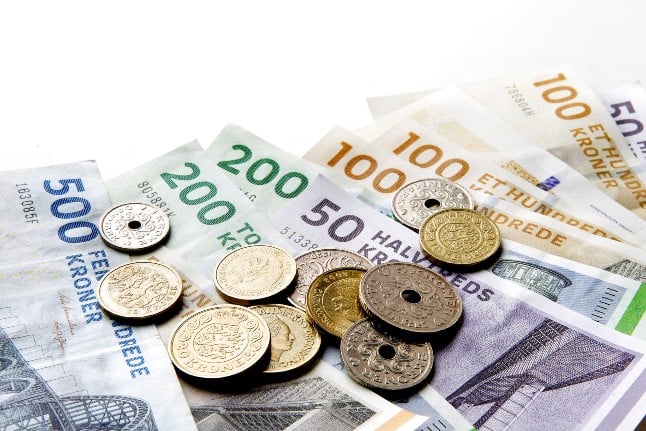Police could have stopped the robbers had they acted faster, the report found
Surveillance cameras weren’t used, the SWAT team was redirected, and intelligence indicating the robbery was imminent wasn’t shared with security companies believed to be possible targets.
The inspection was carried out after Swedish news agency TT’s disclosure last autumn that police could have stopped the robbers and seized their loot had they acted faster.
The National Police Agency (Rikskriminalen, RKP) didn’t inform the Stockholm police or G4S that they knew an aggravated robbery was about to happen.
Additionally, the evacuation of the crime victims took much too long – four hours.
The spectacular helicopter robbery took place the morning of September 23rd, 2009, and rapidly become world around the world.
A helicopter stolen from Roslagens helikopterflyg in Norrtälje north of Stockholm, landed on the roof top of security company G4S’s cash depot in Västberga in southern Stockholm.
Three armed men then entered by breaking the glass dome on the roof. They blew up several doors which allowed them to break into vaults where about a billion kronor ($157.5 million) was kept.
After 32 minutes, the men went back to the helicopter which then took off into the still dark skies over Stockholm.
Both the robbers and their loot were first dropped off in Norsborg north of Stockholm and then in Bromma.
The helicopter was eventually discovered by Skavlöten north of Stockholm.
By that time, the robbers had made off with 39 million kronor.
TT’s review of the robbery revealed that the SWAT team required an hour and 16 minutes after personnel had been evacuated before entering the depot.
By that time, the pilot was already at McDonald’s in Hägersten north of Stockholm, drinking coffee.
This was criticized from several directions, among others from prosecutor Leif Görts who deemed that had the police acted faster they could have caught both the robbers and their bounty.
While the first SWAT team was quickly in place at depot and equipped to enter, the team was then redirected to look for the missing helicopter.
Not before another SWAT team arrived did officers finally enter the depot.
As a result, stuff unable to leave the building in the original evacuation ended up being trapped in the depot for four hours.
According to the police board’s inspection unit, the move amounted to faulty prioritizing.
They also found it “both regrettable and hard to understand” that the task force commander didn’t take advantage of the fact that the Head of Security for G4S, Johan Petersson, was in the commander’s vehicle, and via computer was connected to all surveillance cameras inside the depot.
Neither was the security head’s knowledge of the perimeters, personnel and procedures for the company used, which could have provided a better and more accurate status of the situation, the report said.
Perhaps the most serious critique is aimed at the RKP for not working to prevent the robbery from happening.
“It is an overarching interest and they have failed in that regard. They could have contacted companies that have cash depots and warned them so that they could’ve prepared,” the writer of the report, regional police chief Gunnar Lindelöw told TT.
The RKP received intelligence from Serbian police, informing that a large scale robbery including helicopter would be carried out at the latest on September 15th.
The planned take was 90 million kronor.
They first thought that the Panaxias depot in Bromma would be the target, since they were relocating to now facilities on that date.
The police’s own helicopters were thus relocated from Myttinge to Sörentorp, which is the SWAT base. The night of September 14th the helicopters and the national SWAT team was in place by the Panaxia depot and armed to the teeth.
They intended to arrest the robbers before they entered the depot, and they counted on a fair amount of shooting.
But there was no robbery, and the police hide-out was removed and the helicopters moved back to Myttinge.
From there, they were unable to take off eight days later when the robbery actually occurred, since bags labeled “bomb” were placed outside the hangar.
One decision, however, that was met with approval is not shooting at the helicopter.
However, the SWAT team should have entered the depot earlier, not to arrest the robbers who were too high up in the building, but to evacuate the victims.
“The SWAT team have explained to us that they didn’t consider themselves sufficiently equipped to enter the building, but we have concluded that they were,” Lindelöw said.
The report includes multiple remarks on bad communication between units and people. In this case it failed between the task force commander and the internal management.
Seven men were sentenced to prison for between one to eight years and three were acquitted. In July the case reached a definite ending and the helicopter pilot was denied trial in the Superior Court.



 Please whitelist us to continue reading.
Please whitelist us to continue reading.
Member comments